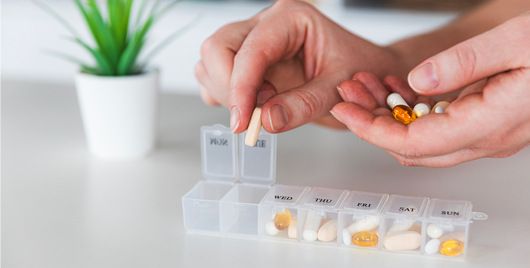When it comes to supplements, people have questions! Here are some frequently asked questions with the answers regarding supplements and your health.
Supplement FAQs
Do I really need a multivitamin? Can’t I just get all of my nutrients from foods?
It’s really difficult to get the nutrients you need from your diet alone. Even if you do eat the recommended five to nine servings of fruits and vegetables per day, only dine on healthy, grass-fed meats, free-range chickens or cold-water fish, limit your refined carbs, and don’t overdo it on sugars, alcohol, and the rest, you’re still not likely to get all the nutrients your body requires.
Many foods today that should be a reliable source of minerals, including magnesium, silicon, manganese, and such, really aren’t. The soil we grow fruits and vegetables in has been terribly depleted, and many of the newer hybrid forms of apples, tomatoes, carrots, and the like sacrifice nutrients for the sake of easier shipping.
And even with the best intentions, we can’t always maintain vigilant control of our diets, especially if we’re traveling, dealing with a hectic schedule, or don’t have time to cook balanced meals.
So you need to get the proper nutrients, in meaningful amounts, from a reliable source. This means finding a full-spectrum multivitamin and mineral formula that provides nutrients at optimal dosage levels throughout the day.
Are the daily values (DVs) or recommended daily allowances (RDAs) for vitamins and minerals all I need?

Not necessarily. The daily value (DV), or what was commonly known as the recommended daily allowance (RDA), is simply a minimum requirement. It is the minimal amount you need to prevent deficiencies–not the amount you need for optimal health.
Take vitamin C, for example. To prevent deficiencies, you only need 30 to 60 mg of vitamin C per day. But we also know that taken at dosages of 500 mg—1,000 mg, vitamin C also supports the immune system, healthy muscles, tendons, and skin, and fights the risk of oxidative stress.* For those reasons, you’ll want to get more than the bare minimum.
Vitamin D is another example. For years, the RDA for adults was 200 IU daily. That has slowly increased to 400 IU and then up to 800 IU daily, depending on age. As more understanding of this nutrient emerges, we’ll see a time when the minimum requirement for vitamin D is probably higher–closer to 1,000 to 2,000 IU daily.
So, remember, the DV and RDA levels aren’t there to promote optimal, vibrant health. They are simply recommendations to help prevent disease states, and nothing more.
The best and most responsible formulations deliver levels of nutrients that have shown the most benefit.
Aren’t all supplements really the same if they mention the same ingredients?
No. Because there are so many generic over-the-counter medicines available, it can be tempting for people to think that all supplemental ingredients are exactly alike. But for results, quality matters. Finding the right ingredients means reading labels carefully.
Take a look at St. John’s wort. Although the herb had been studied for quite a long time, its popularity exploded in the 1990s, so much so that it looked like the marketplace might actually run out of St. John’s wort.
Bear in mind that only extracts from the aerial parts of the plant were clinically shown to deliver benefits. However, this didn’t stop unscrupulous manufacturers from making powder from the roots or stems, filling capsules, and selling it as “St. John’s wort.”
Factually, they were being honest. It was St. John’s wort. It just wasn’t the part of the botanical that had any studied effect.
Now, imagine being the person who starts using a generic supplement that doesn’t work very well. You won’t see great results, so you’re probably not likely to give supplements another chance, which could mean missing out on something truly effective. So, there are critical differences between supplements, even if the front of the packaging and the name of the main ingredient appears to be the same at first glance.
Are capsules or tablets better?
Capsules and tablets are both excellent delivery systems for supplements, as long as they are responsibly formulated. Reputable companies use the best form to most effectively deliver the specific nutrients inside.
Unfortunately, there have been irresponsible manufacturers that have sometimes created poorly formulated tablets and capsules that do not properly break apart. Responsible supplement manufacturers will test their products throughout formulation to make sure they deliver exactly what they say they will. Make sure you are choosing a highly-respected brand that only uses the most effective delivery systems for their supplements.
Should I take my vitamins with meals or on an empty stomach?

Most of the time, you want food in your stomach–unless directions state otherwise. It’s true that water-soluble nutrients don’t require food in order to be absorbed, but you may feel better taking your supplement with meals regardless.
With any fat-soluble vitamins and some forms of niacin, it’s always best to take your supplements with a meal. The extra acidity in your stomach can help break down nutrients from their supplement form and make them more readily bioavailable. Additionally, some vitamins, like niacin, may cause stomach upset if you take them without a meal. (If you’ve ever had a “flushed” feeling after taking a supplement with niacin, you already know what that’s like.)
Should I take my supplements in the morning or at night?
Always follow label directions regarding dosage levels and when to take your supplements. It is generally recommended to take sleep-supporting supplements before bedtime, while energizing supplements are often recommended in the morning. Many supplements however, can be taken anytime, so simply take them when it’s easiest for you to remember.
And of course, some supplements require multiple doses per day. In that case, consider following breakfast, lunch, and dinner with that part of your regimen. In general, always follow the recommendations listed on the label.
What if I forget to take my supplements for a day or two?
It happens to everyone. If you forget, simply start in with your regimen the next day. You don’t need to have a complicated schedule with your supplements either–life is complicated enough! The best advice overall is to simply take your supplements when you can remember them.
Where should I keep my vitamins? Is it okay to keep them in the bathroom cabinet?

Light, moisture, and humidity are not your supplements’ friends, so kitchens and bathrooms are not ideal locations. Our quality assurance team recommends that while “keep in a cool, dark, and dry location” is commonly seen on many vitamin labels, any comfortable room temperature conditions with medium to low humidity is fine. It’s important to limit exposure to light, as well. Clear containers, like the weekly supplement organizers you may see at the pharmacy, don’t always protect the supplements from light.

